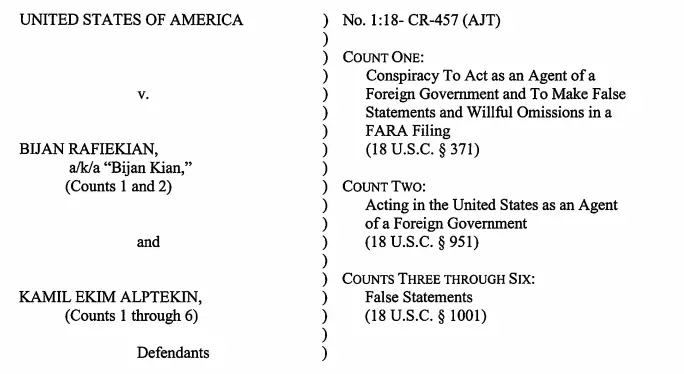
On July 23, 2019, a federal jury convicted Bijan Rafiekian (also known as Bijan Kian), a former business partner of Michael Flynn, of conspiring to file a materially false statement under FARA and of violating a statute that is similar to FARA at 18 U.S.C. § 951. The conviction represents a key victory for the Department of Justice (DOJ) as it seeks to more aggressively enforce FARA. As Assistant Attorney General John Demers stated following the verdict, “Through misrepresentations in his FARA filing, Mr. Rafiekian attempted to deceive the public and influence key leaders on behalf of Turkey. The Department of Justice treats these crimes with the gravity that they deserve.”
Rafiekian ran a consulting firm, Flynn Intel Group (FIG), with Michael Flynn, President Trump’s former National Security Advisor, which was hired in 2016 to advocate for the extradition of Turkish dissident cleric Fethullah Gulen. Prosecutors accused Rafiekian, who was also part of President Trump’s transition team, of concealing Turkish government officials’ involvement in the lobbying campaign on behalf of Turkish President Erdogan to expel Gulen from the United States. According to the indictment, Rafikian and his business partner, Kamil Alptekin, “conspired covertly and unlawfully to influence U.S. politicians and public opinion” concerning Gulen and sought to conceal Turkey’s involvement in these efforts. The prosecution alleged that high-level Turkish officials approved the budget for the project and that Alptekin regularly updated them. FIG submitted a retroactive FARA registration on March 7, 2017, that among other alleged omissions and false statements, listed Alptekin’s Dutch company, Inovo BV, as its only “foreign principal” and indicated that Inovo BV was not supervised by a foreign government or other foreign principal.
Rafiekian’s defense attorneys insisted that there was no actual agreement with or direction by the Turkish government to influence American policy, arguing that prosecutors could not demonstrate that Turkey paid for the project. The defense also asserted that the project was funded and directed by Inovo BV, and that Rafiekian did not have the criminal intent required to establish a FARA violation, instead relying in good faith on “erroneous legal advice” in his failure to file as a foreign agent.
Prosecutors originally planned to have Michael Flynn testify, but decided against it after Flynn refused to admit he lied about the Turkish project and claimed he had not read FARA filings he submitted to DOJ. Flynn and Rafiekian’s firm received $530,000 for its work on the effort.
It remains to be seen whether the verdict will stand; U.S. District Court Judge Anthony Trenga, who described the evidence against Rafiekian as speculative and circumstantial, has set a hearing on September 5 on Rafiekian’s attorneys’ motion to throw out the jury’s verdict. If the verdict stands, Rafiekian faces up to 15 years in prison.
The Rafiekian case was the first to go to trial since DOJ began its more aggressive crackdown on FARA violations. The conviction is the 44th criminal case to reach resolution in FARA’s history. The conviction illustrates the difficulty of defending FARA cases—the statute is exceedingly broad and alleged foreign agents are often unsympathetic defendants. The conviction could embolden the Department of Justice to prosecute more FARA cases in the future.
An Informational Resource in a New Era of Foreign Agents Registration Act Enforcement.
Search
Recent Blog Posts
- Comment Period for FARA Rulemaking Closes
- AG Bondi Issues Important FARA Directive
- DOJ (Finally) Publishes Proposed Revisions to FARA Regulations
- DOJ Publishes 14 New Advisory Opinions
- Former Aide to New York State Governor Kathy Hochul Charged with Acting as an Unregistered Foreign Agent of China
- Two Employees of Russian State-Controlled Media Outlet Indicted for Funding and Directing U.S. Company that Published Pro-Russia Propaganda
- Pierre Girgis Pleads Guilty to Misdemeanor Failure to Label Information
- DOJ Charges Former National Security Council Official
- U.S. Senator Robert Menendez Convicted of Acting as a Foreign Agent
- DOJ’s FARA Unit Releases 15 New Advisory Opinions
Bios
Archives
- March 2025
- February 2025
- December 2024
- September 2024
- August 2024
- July 2024
- June 2024
- May 2024
- January 2024
- July 2023
- December 2022
- November 2022
- October 2022
- May 2022
- April 2022
- March 2022
- January 2022
- December 2021
- October 2021
- July 2021
- March 2021
- February 2021
- December 2020
- November 2020
- September 2020
- June 2020
- May 2020
- February 2020
- October 2019
- September 2019
- August 2019
- July 2019
- June 2019
- May 2019
- April 2019
- March 2019
- February 2019
- January 2019

